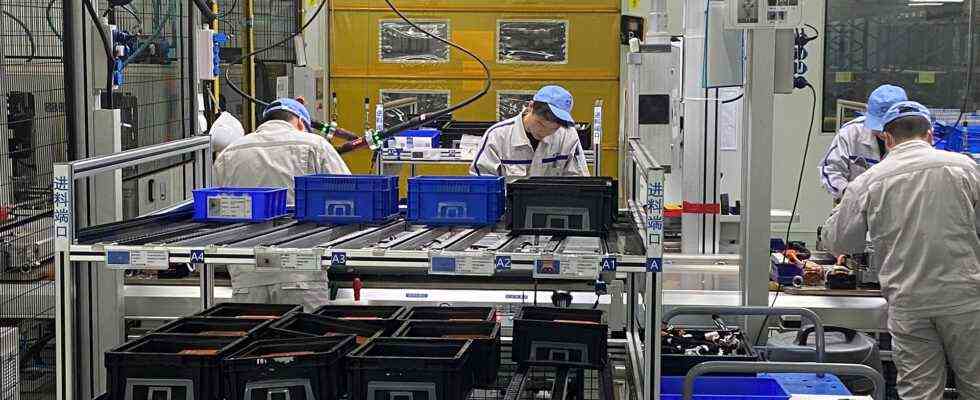Status: 13.09.2021 2:50 p.m.
China’s economy is booming – at least that’s what the statistics say. Foreign trade and industrial production are booming. But at second glance, there are also problems.
A battery production plant for electric cars in the city of Changhsu north of Shanghai. Robots move steel-sheathed battery packs on an assembly line. Next to it are workers in gray overalls and light blue dust-protection caps. They connect cables and build in controls.
Is domestic consumption enough?
In industries that have anything to do with e-cars and battery technology, things are currently doing particularly well in China. Because these areas of industry are particularly promoted by the state and party leadership – politically and financially. “Everything that has to do with solar cells – e-mobility, industrial robots – are areas that fit perfectly into China’s national strategy of the green economy. So these industries are doing well,” explains Dan Wang, China’s chief economist the Hang Seng Bank in Shanghai. She expects China’s gross domestic product to grow by up to 8.5 percent this year; significantly more than the almost three percent that most economic experts predict for Germany.
But: There are still structural economic problems in China. “Exports are China’s growth drivers. Industrial production, for example, is running at full speed in China, but what is produced is often exported,” said the analyst. “Domestic investment and consumption are relatively weak. And we do not expect this situation to improve anytime soon.”
German companies with problems
China’s economy also suffers – like almost all countries in the world – from disrupted supply chains, high freight and container costs and the lack of computer chips. The peculiarity: China’s economic policy has at least partially caused all of these problems. Very few believe that the difficult global trade conditions will soon change. “Large corporations can adapt to the situation. But small and medium-sized companies must prepare for further turbulence and problems,” says Nick Marro, an analyst for world trade at the Economist Intelligence Unit (EIU) in Hong Kong. “That goes for the coming quarters, if not for the next few years.”
German companies that are active in China are increasingly not only complaining about supply chain problems and the lack of computer chips; Often they are also worried about increased wage costs and stricter environmental and data protection requirements – and of course the People’s Republic’s borders, which have been almost completely closed for around a year and a half. Since then, business trips to China have been almost impossible. Many German company managers in China say that corporate headquarters in Germany are increasingly lacking awareness of all these problems.
China’s economy: lots of light, lots of shadow
Steffen Wurzel, ARD Shanghai, September 13th, 2021 11:16 am

